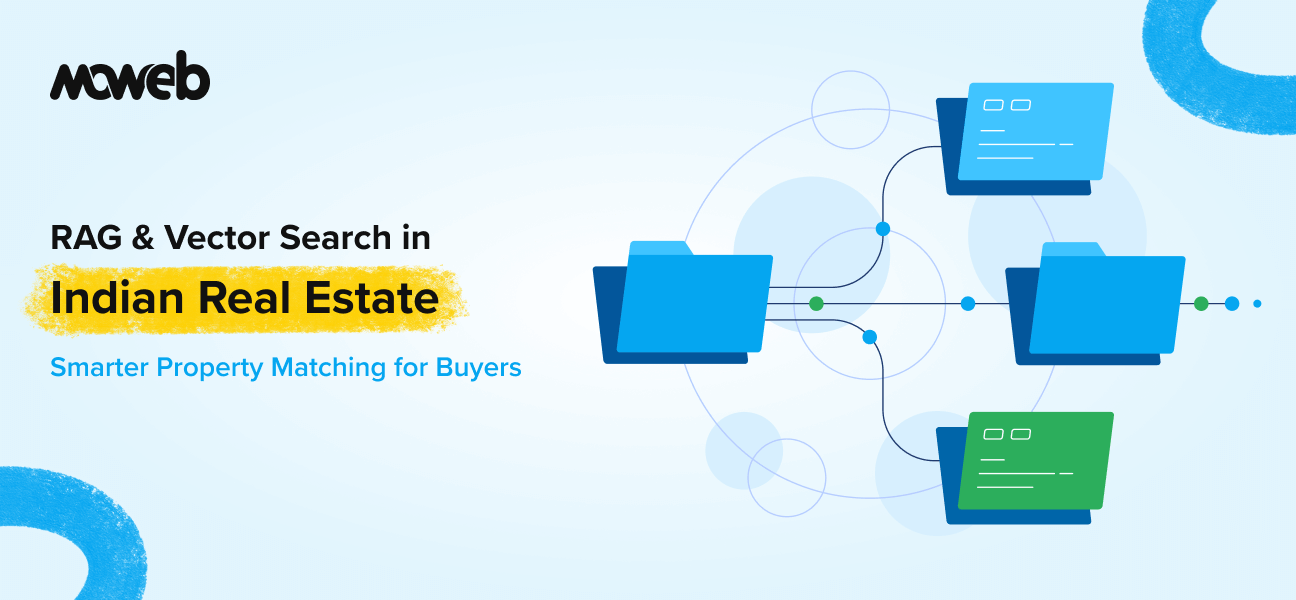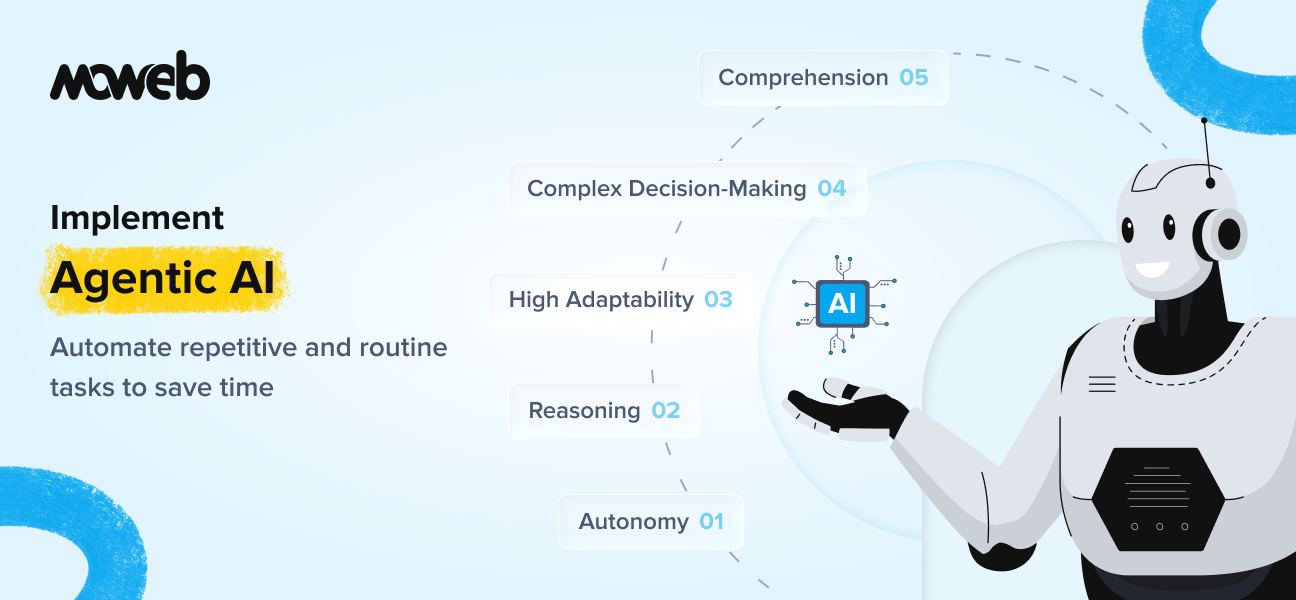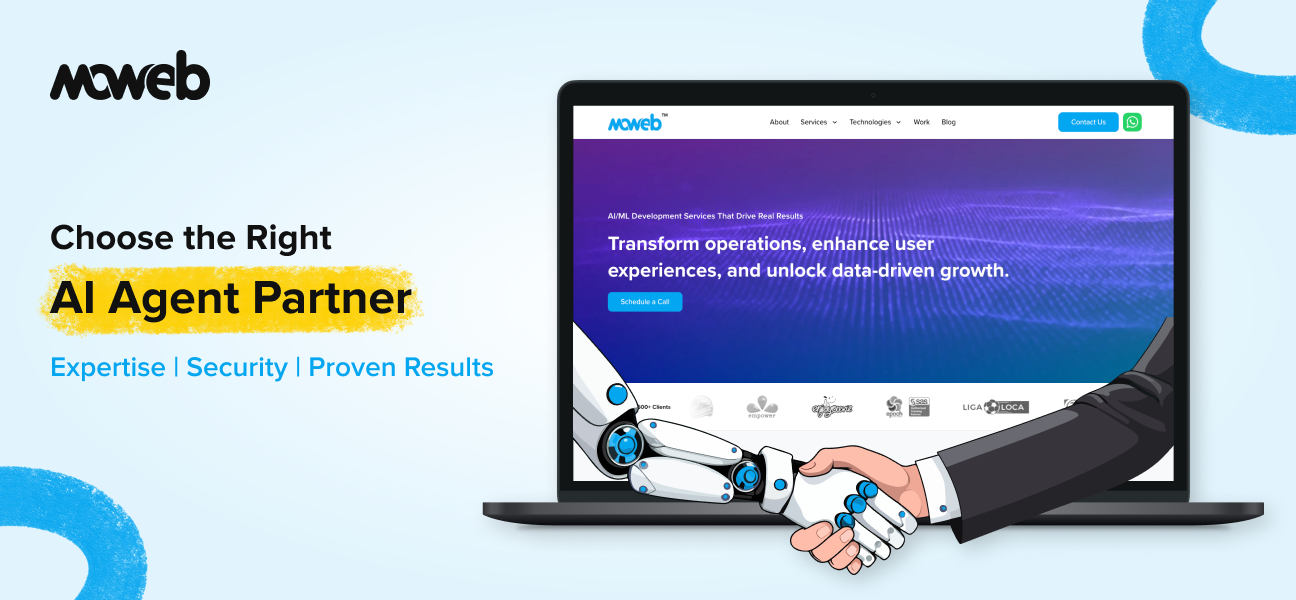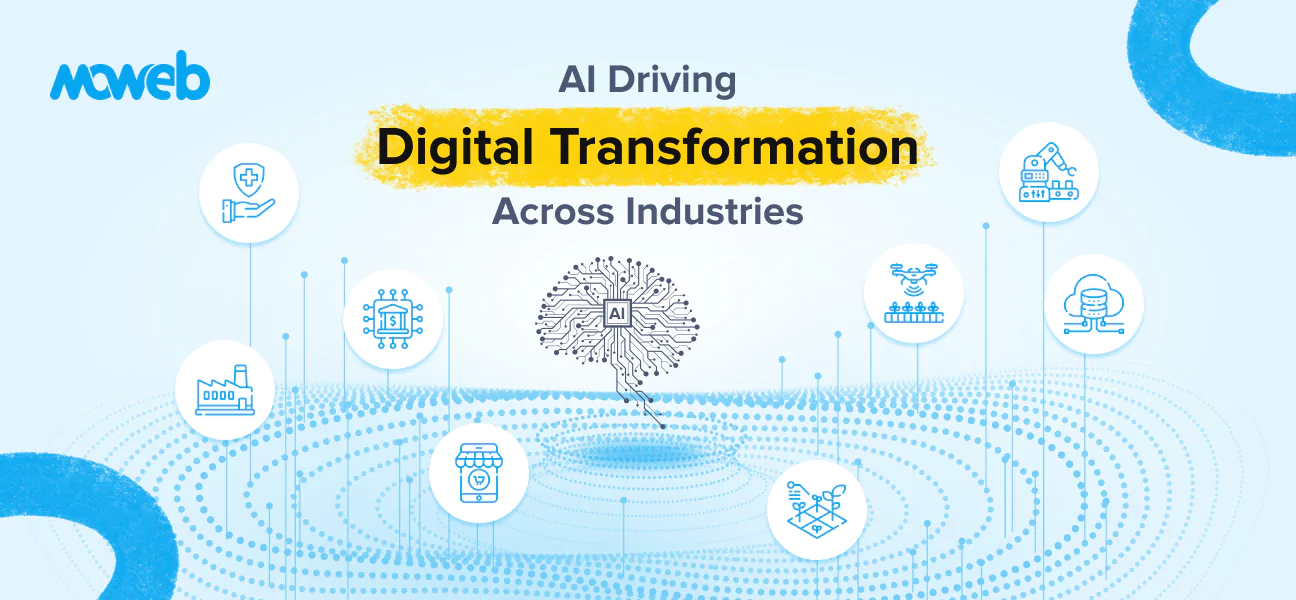
Today, artificial intelligence is the heart and soul of every business. Be it a startup, a corporate, or a mid-sized organisation, AI is creating waves that are reaching every corner of a business. It’s not just about robots or chatbots anymore. Today, AI is the core of almost everything. It is working behind the scenes, helping make business decisions faster, personalizing customer experiences, and improving efficiencies in ways unimaginable before.
In 2025, over 1.8 billion daily users will rely on AI, and the global AI market is expected to reach $244 billion. Roughly one-third of organizations now use AI to address labor shortages, while 42% are actively considering adoption soon.
Digital Transformation & Its Importance in Today’s Business Landscape
The integration of digital technology into every area of business, fundamentally changing how businesses operate and deliver value to customers, is what digital transformation means. Businesses can no longer ignore how important AI is in today’s world. AI, IoT, and cloud computing are a few examples of technologies that have moved from optional to the core drivers of having a competitive edge.
Over the next 3 years, 92% of organisational executives plan to boost spending on AI, reflecting its significant role as a pillar of digital transformation strategies. Companies that still plan to wait are at risk of being outpaced by data-driven competitors that are leveraging AI.


Ready to Unlock AI for Your Business?
Contact us to get a personalized quote and start building your custom AI solution today!
Understanding AI’s Role in Digital Transformation
AI’s impact on digital transformation is profound and multi-dimensional:
- It automates routine processes, improving operational efficiency beyond human capability.
- AI-driven personalization tailors experiences at scale, anticipating user needs in real time.
- Data-driven insights fuel faster, smarter decision-making across the enterprise.
The key AI technologies enabling this transformation include:
- Machine Learning (ML): Learns from data to automate predictions and recommendations that continuously improve business outcomes.
- Natural Language Processing (NLP): Powers chatbots and virtual assistants, transforming customer interactions with natural, conversational experiences.
- Computer Vision: Enables recognition and analysis of images and videos, enhancing quality control, diagnostics, and security measures.
- Predictive Analytics: Forecasts trends and behaviors, empowering proactive business decisions that reduce risk and maximize opportunity.
- Robotic Process Automation (RPA): Automates repetitive tasks, freeing up human talent to focus on strategic, creative, and complex work.
- Speech Recognition: Supports virtual agents, hands-free operation, and accessibility to deliver seamless user experiences across devices.
- Personalized Interactions: Real-time marketing and loyalty programs that dynamically adapt to individual customer behaviors and preferences.
- Data-Driven Decisions: Smart dashboards and automated reporting that provide actionable insights for swift, confident strategic moves.
However, digital transformation with AI goes far beyond cost-saving automation. AI-powered transformation enables:
- Hyper-personalized marketing and sales
- Scenario modeling for risk and crisis management
- Real-time supply chain optimization
- Dynamic pricing and inventory management
- Fraud detection and regulatory compliance
How AI Development Companies are Driving Digital Transformation Across Industries
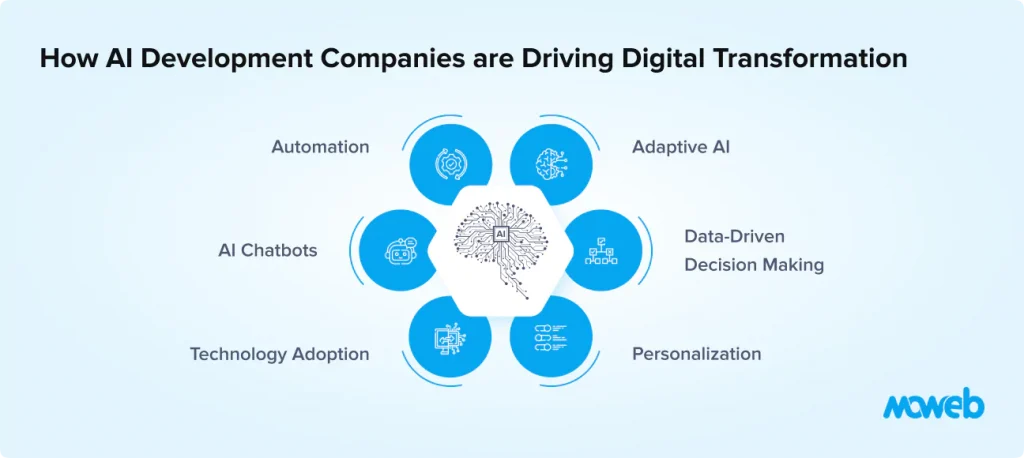
Behind every successful digital transformation initiative, you’ll often find the expertise of an experienced AI development company. These specialists don’t just implement technology; they thoughtfully partner with businesses to tailor AI solutions that create real, measurable impact across industries.
Let’s look at how leading AI companies such as Moweb are driving industry-wide change:
1. AI-Powered Automation for Efficiency
AI development companies build systems that automate repetitive, time-consuming tasks. By deploying AI-powered automation, they help companies reduce errors, boost productivity, and allow employees to focus on higher-value work.
For example, in agriculture, Moweb’s smart automation solutions handle everything from precision irrigation to livestock monitoring, increasing yields and conserving resources.
2. Adaptive AI Tailored to Industry Needs
Every industry faces its own unique challenges. Top AI development company, like Moweb, design intelligent solutions that adapt to specific sector requirements. This could mean advanced computer vision for manufacturing, real-time supply optimization in logistics, or personalized risk scoring in fintech.
Moweb works closely with clients to identify bottlenecks and opportunities, then customizes AI models to deliver meaningful results.
3. Transforming Customer Interactions with AI Chatbots
Modern consumers expect instant support and personalized experiences. AI-powered chatbots, designed and integrated by enterprise software development company like Moweb, provide 24/7 customer assistance, resolve queries, and gather insights, elevating customer satisfaction while reducing operational costs.
4. Data-Driven Decision Making
AI development companies give organizations the tools to harness their data for actionable insights. With machine learning and advanced analytics, businesses can forecast demand, detect fraud, optimize pricing, and make proactive, informed decisions.
In fintech, Moweb’s intelligent analytics platforms detect suspicious activities in real time, safeguard transactions, and personalize financial recommendations.
5. Accelerating Technology Adoption
It’s not just about adding a chatbot or automating a workflow. True digital transformation with AI means reimagining core business processes. Enterprise-level AI solutions from experts like Moweb empower organizations to integrate AI smoothly, scale effectively, and stay resilient in quickly evolving markets.
6. Personalization at Scale
Consumers want experiences tailored just for them. Moweb leverages AI to segment audiences, predict preferences, and deliver recommendations, whether it’s smarter crop strategies in agriculture, optimized delivery in supply chains, or customized financial products for fintech clients.
How AI Powers Business Towards Digital Transformation
- Machine Learning Algorithms
- NLP
- Computer vision
- Predictive Analysis
- Robotic Process Automation
- Speech Recognition
- AI-Powered Analysis
- Personalized interactions
- Data-driven decisions
Industry-Specific AI Transformations (Deep Dive with Examples)
Innovative AI for digital transformation is driving specialized change across every sector, delivering tailored value and revolutionizing traditional processes. From AI in digital transformation of agriculture to AI-powered transformation in finance and healthcare, here’s how artificial intelligence transformation is creating next-level industry impact.
Finance: Fraud Detection & AI-Powered Banking
- AI Fraud Detection: Platforms like Mastercard’s Decision Intelligence use advanced AI digital transformation to analyze millions of transactions in real time, spotting and stopping fraudulent activity before it harms your business or customers.
- Robo-Advisors: Leading fintech disruptors, such as Betterment and Wealthfront, leverage machine learning digital transformation to automate investment strategies, offering personalized portfolio management at scale.
- Future Trend: Decentralized finance (DeFi), powered by artificial intelligence digital transformation, is reshaping how consumers interact with banking, enabling real-time, trustless transactions and smarter risk management.
Agriculture: AI for Sustainable Farming
- Precision Farming: Companies like John Deere are at the forefront of digital transformation using AI, developing smart tractors that utilize data and sensors to optimize planting, fertilization, and harvest, maximizing yield and resource efficiency.
- Drone-based Crop Monitoring: Modern farms now employ AI and machine learning to interpret drone-collected imagery, identifying issues like pest outbreaks or irrigation needs, all in real-time.
- Future Trend: Climate-resilient agriculture is emerging, where AI-powered analysis forecasts weather, predicts crop health, and suggests adaptive strategies for better sustainability, demonstrating the broad power of AI in digital transformation for the agricultural sector.
Healthcare: Agentic AI & Personalized Care
- AI-Driven Diagnostics: Healthcare organizations are advancing digital transformation with AI-powered diagnostic tools that interpret images, flag anomalies, and support clinicians in making quicker, more accurate diagnoses.
- Predictive Patient Monitoring: Machine learning digital transformation enables continuous analysis of patient vitals, enabling early warnings for critical conditions and more proactive care.
Apps like Health-ePeople showcase artificial intelligence digital transformation by delivering individualized treatment plans and boosting operational efficiency through smart data integration and workflow automation.
Manufacturing & Industry 5.0: Smarter Operations
- Predictive Maintenance: Manufacturers embrace AI digital transformation to analyze equipment data, forecast failures, and implement maintenance before breakdowns occur, reducing costly downtime.
- AI-Powered Defect Detection: Computer vision systems scan production lines, catching defects invisible to the human eye and maintaining top-tier quality standards.
- Smart Robotics: Industry 5.0 highlights the collaboration between humans and intelligent machines, enabling flexible, highly productive factories.
For example, Siemens is leveraging artificial intelligence transformation to streamline gas turbine manufacturing, optimizing each process step and accelerating innovation.
Key Drivers Accelerating AI-Led Digital Transformation
Several groundbreaking innovations and trends are fueling the rapid advancement and adoption of AI, driving digital transformation across industries.
Multimodal AI
Multimodal AI combines diverse data types – text, images, video, and real-world sensor inputs into unified models. This holistic approach enables richer insights and more accurate decision-making, powering advanced applications from autonomous vehicles to intelligent content analysis.
Democratization of AI
The rise of no-code and low-code platforms, along with open-source AI models, is democratizing access to artificial intelligence digital transformation. This broadens AI adoption beyond specialized teams, empowering businesses of all sizes to develop and deploy AI-powered transformation solutions quickly and cost-effectively.
Edge AI
Edge AI processes data locally on devices rather than centralized servers, delivering real-time insights while enhancing privacy and security. This is critical in applications like IoT, healthcare monitoring, and smart manufacturing, where instant, decentralized processing is key.
Explainable AI (XAI)
Explainable AI brings transparency to AI’s decision-making processes. By making models interpretable and their outcomes understandable, XAI fosters trust, regulatory compliance, and better governance, essential for responsible AI-led transformation.
Digital Humans and Twinning
Digital humans and virtual twins simulate customer personas and operational environments, enabling realistic testing and personalized interactions. These digital counterparts improve customer experience, workforce training, and risk management by creating dynamic simulations rooted in real-world data.
Key Benefits of AI in Digital Transformation
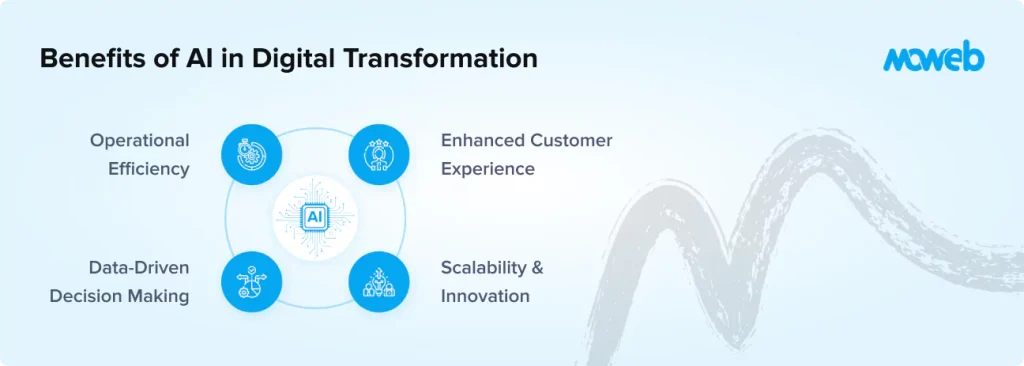
Harnessing AI unlocks significant advantages, boosting efficiency, enhancing customer experiences, enabling smarter decisions, and fostering innovation at scale.
Operational Efficiency
AI-powered automation drastically reduces costs by streamlining workflows, minimizing errors, and accelerating throughput. This enables organizations to do more with less, optimizing resources and improving overall productivity.
Enhanced Customer Experience
AI-driven personalization tailors recommendations and support through technologies like 24/7 chatbots and dynamic marketing. This creates more engaging, responsive, and satisfying customer interactions that drive loyalty and growth.
Data-Driven Decision Making
Advanced predictive analytics and AI modeling enable businesses to anticipate trends, identify opportunities, and mitigate risks. Harnessing these data-driven insights transforms strategy from guesswork into confident, proactive planning.
Scalability & Innovation
AI accelerates experimentation and innovation by rapidly analyzing large datasets, automating iterative testing, and enabling agile development cycles. This scalability helps businesses evolve faster and disrupt markets with novel products and services.
How to Get Started: A Practical Digital Transformation Roadmap
Starting your AI for digital transformation journey requires a clear, structured roadmap to ensure successful adoption and lasting business impact.
Assess Readiness and Set Objectives
Begin by evaluating your organization’s current technological capabilities, data maturity, and workforce skills. Clearly define the goals you want to achieve with AI for digital transformation to ensure alignment with your business vision and priorities.
Identify Unique, Industry-Specific Use Cases
Focus on identifying high-impact opportunities where AI can solve specific challenges or unlock value unique to your industry. Prioritize use cases with clear benefits and feasibility to maximize early success.
Build a Customer-Centric Business Strategy
Design your digital transformation initiatives around delivering enhanced value and personalized experiences to your customers. Use AI to understand customer needs better and refine your products, services, and interactions accordingly.
Choose the Right Partners and Technologies
Collaborate with experienced AI Development Companies and enterprise software providers who understand your industry’s nuances. Select scalable, secure, and adaptable AI technologies that integrate well with your existing systems.
Measure, Iterate, Scale
Establish clear KPIs and success metrics to evaluate progress. Continuously gather feedback, learn from initial deployments, and refine your AI solutions. Once proven, scale the transformation across departments and business functions for sustained impact.
Challenges & Risks of AI-Driven Digital Transformation
AI-driven digital transformation also presents challenges and risks that organizations must thoughtfully manage to succeed.
- Data Privacy: Ensuring ethical AI deployment while navigating GDPR and other regulatory requirements.
- Integration Complexity: Overcoming challenges in connecting legacy systems with modern AI-powered platforms.
- Bias in AI Models: Developing fair and explainable AI models to minimize bias and promote transparency.
- Workforce Disruption: Preparing employees for AI-augmented roles through upskilling and reskilling initiatives.
Future Trends: Where AI is Taking Digital Transformation Next
Artificial intelligence digital transformation is evolving rapidly, driven by emerging technologies and shifting business needs. Here are the key future trends shaping the next wave of AI-led digital transformation across industries.
AI + IoT Convergence
The fusion of AI and the Internet of Things (IoT) is creating smarter cities and more connected devices. This convergence enables real-time data processing and intelligent automation at the edge, driving efficiency and seamless user experiences.
Quantum AI
Quantum computing is unlocking faster, more complex computations, which will accelerate AI’s problem-solving capabilities in areas like drug discovery, financial modeling, and logistics optimization, pushing AI digital transformation into new frontiers.
AI Democratization
No-code and low-code AI tools are making artificial intelligence accessible to small and medium-sized enterprises (SMEs), empowering a broader range of businesses to implement AI-powered transformation without deep technical expertise.
Self-Learning AI Systems
Future AI systems will increasingly improve autonomously, learning from data without human intervention. This shift toward self-learning AI will enhance adaptability and scalability in digital transformation initiatives.
Rise of Smaller, Domain-Specific AI Models
Smaller, specialized AI models tailored to specific industry needs will become mainstream, enabling faster deployment and more precise AI-powered transformation solutions.
Industry Convergence Enabled by AI
AI will increasingly act as the connective tissue between disparate sectors, facilitating cross-industry innovation and integrated value chains for a more cohesive digital ecosystem.
Preparing for Job Shifts and the Augmented Future
As AI and workforce augmentation accelerate, businesses and employees must adapt to changing roles. Influencers like Mo Gawdat and DeepMind highlight the growing importance of reskilling and embracing AI-human collaboration in the future of work.
Conclusion
It goes without saying that AI is a long-term innovation partner for every business that empowers businesses to rethink, reinvent, and lead in their industries. The winners of tomorrow will be those who audit their industry’s pain points, define clear AI transformation objectives, and invest in data maturity and training.
To embark on a successful digital transformation using AI, start by auditing your industry pain points, defining clear AI objectives, and investing in data maturity. Strategic adoption of AI digital transformation, balanced with ethical considerations, will set your organization on a path to sustainable growth and competitive advantage.
Is your business ready for an artificial intelligence transformation? Evaluate your needs, consult with an AI development company such as Moweb, and take your first step toward sustainable, human-centric digital transformation.
FAQs
- What is the difference between digitalization and digital transformation?
Digitalization is converting processes and data into digital formats, while digital transformation using AI involves a strategic overhaul of business models by leveraging artificial intelligence transformation for innovation and growth. - How can a small business afford to implement AI?
Cloud platforms, no-code tools, and scalable solutions make AI for digital transformation accessible and cost-effective for SMEs, allowing gradual adoption without large upfront investments. - How do you get started with an AI strategy?
Begin by auditing business pain points, set clear objectives, and collaborate with AI development companies for a tailored digital transformation roadmap. - What is the role of data in a successful AI transformation?
High-quality, integrated data powers AI digital transformation, enabling more accurate insights, personalized experiences, and effective machine learning digital transformation outcomes. - How does AI differ from traditional automation in digital transformation?
Traditional automation follows static rules, while artificial intelligence transformation adapts, learns, and optimizes workflows for superior efficiency and innovation. - Which industries benefit most from adopting AI for digital transformation?
Finance, healthcare, manufacturing, agriculture, and logistics are leading the charge in AI-driven digital transformation, but nearly every sector can unlock value. - Are there risks involved in large-scale AI implementation?
Yes, data privacy, integration complexity, model bias, and workforce disruption are key risks that need thoughtful management during any AI-powered transformation. - How can companies measure the success of digital transformation initiatives?
Track key performance indicators like operational efficiency, customer satisfaction, revenue growth, and adoption rates to evaluate the impact of your AI led transformation.
Found this post insightful? Don’t forget to share it with your network!



